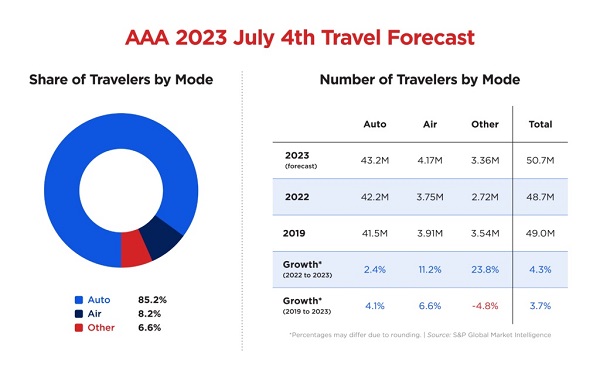WASHINGTON, DC—AAA projects that 50.7 million Americans will travel 50 miles or more from home this Independence Day weekend*, setting a new record for the holiday. Domestic travel over the long weekend will increase by 2.1 million people compared to 2022. This year’s projection surpasses the previous July 4th weekend record set in 2019 of 49 million travelers.
“We’ve never projected travel numbers this high for Independence Day weekend,” said Paula Twidale, Senior Vice President of AAA Travel. “What this tells us is that despite inventory being limited and some prices 50% higher, consumers are not cutting back on travel this summer. Many of them heeded our advice and booked early, another sign of strong travel demand.”
This July 4th weekend is expected to set a new record for the number of Americans traveling by car for the holiday. AAA expects 43.2 million people will drive to their destinations, an increase of 2.4% over 2022 and 4% higher than 2019. This summer, gas prices are well below what they were one year ago. The national average for a gallon of regular was $4.80 on July 4th, 2022. Gas prices have remained steady the past couple of months, with the national average hovering around $3.50 to $3.60 a gallon, thanks to the lower cost of oil.
Air travel is also expected to set a new record. AAA projects 4.17 million Americans will fly to their destinations Independence Day weekend, an increase of 11.2% over 2022 and 6.6% over 2019. The previous July 4th weekend air travel record of 3.91 million travelers was set in 2019. The share of air travelers in the overall holiday forecast this year is an impressive 8.2% – the highest percentage in nearly 20 years.
Other modes of transportation are also on the rise this year. AAA expects 3.36 million people will travel by bus, cruise, or train over the long weekend, an increase of 24% over last year. While more travelers are turning to these modes this year, the number is not expected to surpass 2019’s total of 3.54 million.
Best/Worst Times to Travel and Peak Congestion by Metro
INRIX, a provider of transportation data and insights, expects Friday, June 30 to be the busiest day on the roads during the Independence Day holiday weekend, with average travel times up nearly 30% over normal. Major metros like Boston, Seattle, and Washington, DC are expected to see the worst traffic. INRIX recommends leaving in the morning or after 6 p.m. to avoid the heaviest holiday congestion.
“With record-breaking travelers expected on the road this holiday weekend, drivers should prepare for above-average delays to their favorite destinations,” said Bob Pishue, transportation analyst at INRIX. “Using traffic apps, local DOT notifications, and 511 services are key to minimizing holiday travel traffic frustrations this Independence Day.”
| Best and Worst Times to Travel by Car | ||
| Date | Worst Travel Time | Best Travel Time |
| Thu, June 29 | 4:00 – 6:00 PM | Before 12:00 PM |
| Fri, June 30 | 10:00 AM – 5:00 PM | Before 10:00 AM, After 6:00 PM |
| Sat, July 1 | 1:00 PM | Before 12:00 PM |
| Sun, July 2 | Minimal Traffic Impact Expected | |
| Mon, July 3 | Minimal Traffic Impact Expected | |
| Tue, July 4 | 12:00 – 3:00 PM | Before 11:00 AM, After 6:00 PM |
| Wed, July 5 | 3:00 – 6:00 PM | Before 2:00 PM |
Additional details are available in the graphic below and at AAA.com here.
Full list of 2023 Independence Day fireworks displays in Baltimore County

* Independence Day Holiday Travel Period
For purposes of this forecast, the Independence Day holiday travel period is defined as the five-day period from Friday, June 30 to Tuesday, July 4. When the Fourth of July falls on a Wednesday, it is considered to be a six-day holiday period, when it falls on any other day of the week the holiday period is a five-day window.
Photo by Taras Makarenko from Pexels
Do you value local journalism? Support NottinghamMD.com today.

